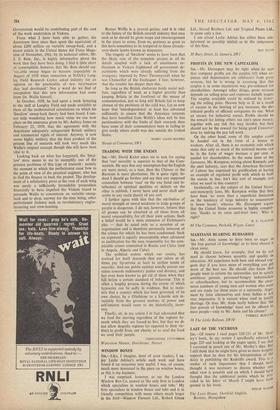PROFITS IN THE NEW CAPITALISM SIR,—Mr. Davenport may be right
when he says that company profits are the surplus left when ex- penses and depreciation are subtracted I rom gross revenue, but he is wrong in assuming that this surplus is in some mysterious way pre-ordained for shareholders. Amongst other things, gross revenue depends on selling price and expenses include wages. The surplus available could be reduced by lower- ing the selling price. Heaven help us if, as a result of success in the limiting of pay increases, the dis- tributed profits of efficient companies do rise. What an excuse for industrial unrest. Profits should be the reward for letting others use one's spare money, together with any risk this may involve, but they should not be the reward for being good Conserva- tives by making the pay lull work.
On the other hand, some of this surplus could be handed out in the form of a bonus to workers. After all, there is no economic rule which states that only so much of the national income can be in the form of wages because x per cent. is needed for shareholders. In the same issue of the Spectator, Mr. Kempton, writing about Kennedy and the steel industry, says that the American Secretary of Labour has expressed his gratification at having an example of regulated profit with which to hold the unions in line. Isn't this sort of example just what we need in this country? Incidentally, on the subject of the United States' anti-monopoly laws, Mr. Kempton writes that they have been `no more than a superficial limitation on the tendency of large industry to concentrate in fewer hands'; whereas Mr. Davenport argues that the United States economy is highly competi- tive, 'thanks to its stern anti-trust laws.' Who Is right?
B. C. CLAUSGN
68 The Common, Parbold, Wigan, Lancs






































 Previous page
Previous page